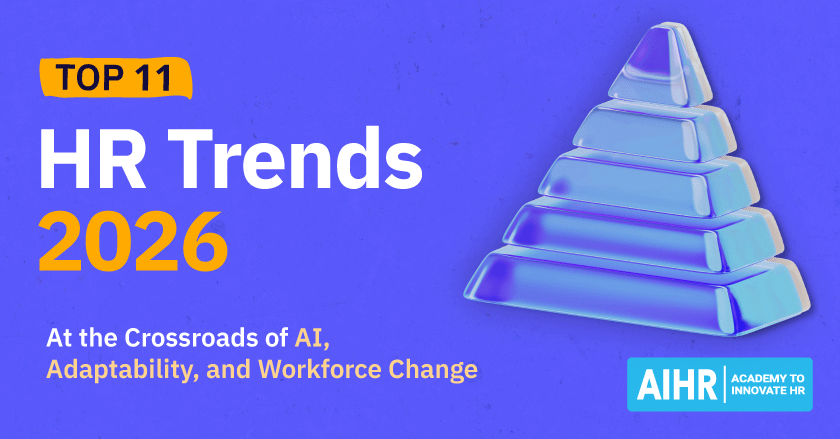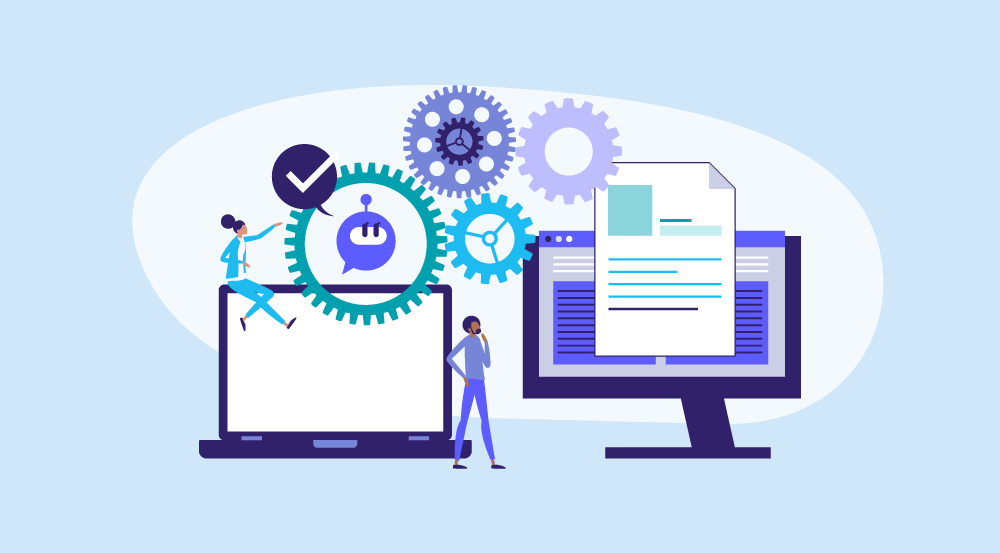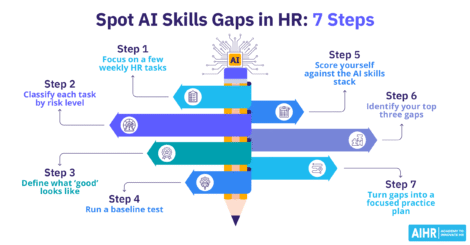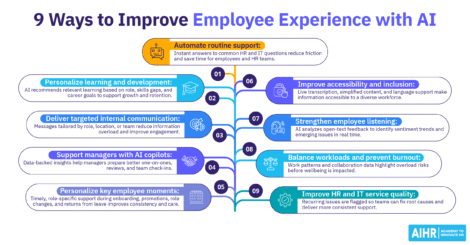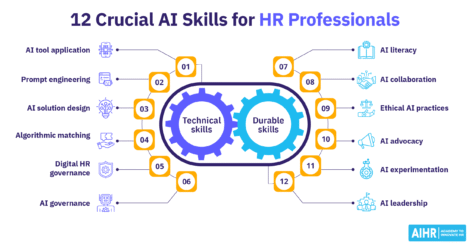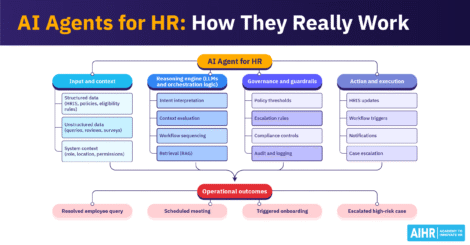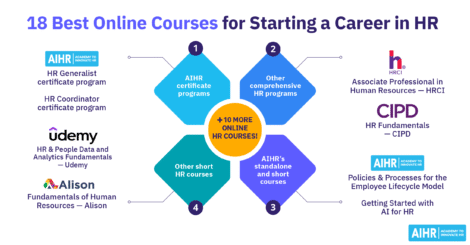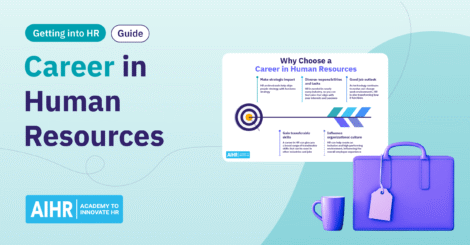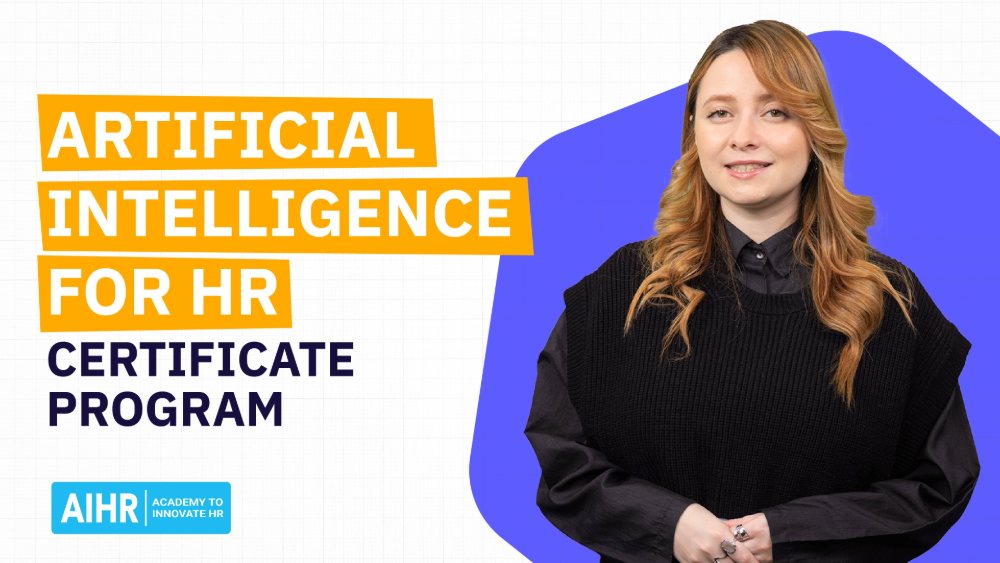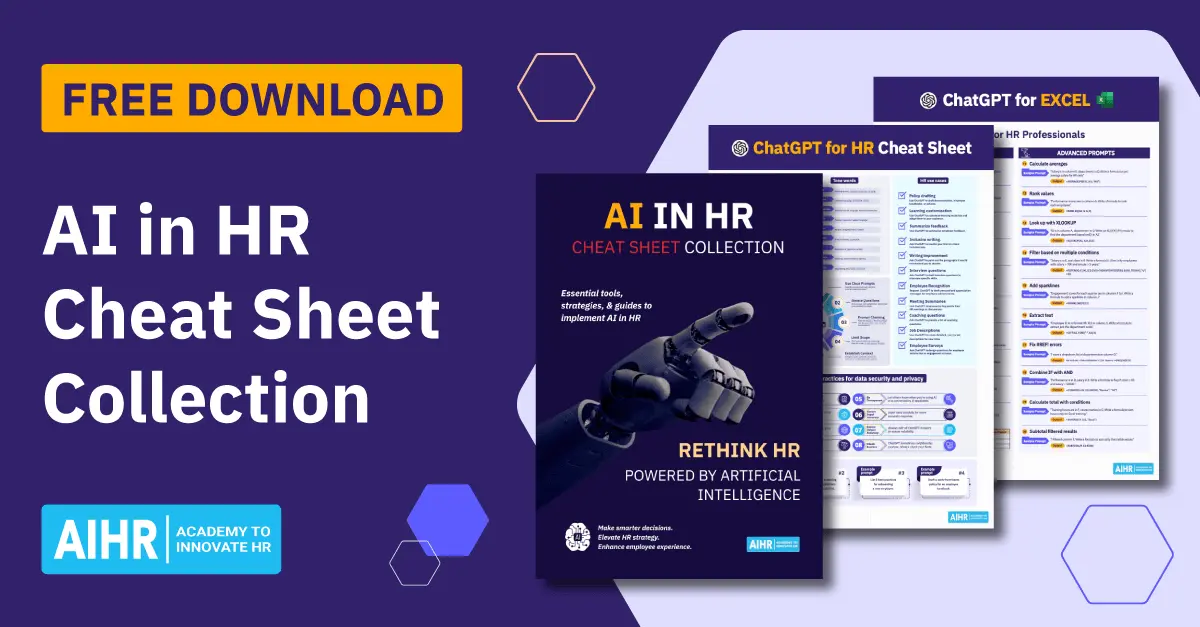AI is revolutionizing performance management by making it more effective, objective, and actionable. Through automation and real-time feedback, AI can make performance management a truly valuable tool for growth.
This is especially important for employees, who are 57% less likely than leaders to view performance management as successful. AI, however, can improve employee engagement initiatives through more efficient performance management programs. This article discusses AI’s importance in performance management and its practical applications in this area.
Contents
Why should HR use AI in performance management?
11 practical applications of AI in performance management
HR roadmap for implementing AI in performance management
Why should HR use AI in performance management?
Performance management is critical but time-consuming. It requires managers to balance feedback and oversight with other responsibilities, while employees may feel judged by unclear criteria. HR can streamline this process with AI, making it simpler and more effective. The benefits of doing so include:
- Objectivity: AI can analyze performance data based on impartial metrics instead of subjective impressions, minimizing bias and ensuring fairness.
- Enhanced feedback: AI can also analyze performance data continuously and produce real-time feedback to help employees make improvements while they work.
- Efficiency: AI automates administrative tasks such as data collection, analysis, and report generation. This saves managers time that they can use to focus on strategic tasks.
- Predictive analytics: AI-generated examination of historical data produces predictive analytics that can assist HR in areas like talent acquisition and management.
Want to quickly level up your use of AI in HR, including performance management? Download the AI in HR Cheat Sheet Collection to get 10 practical one-pagers with ready-to-use prompts, tool recommendations, and AI use cases across recruiting, L&D, feedback, and more. Perfect for saving time and making confident, informed decisions when integrating AI into your HR processes.
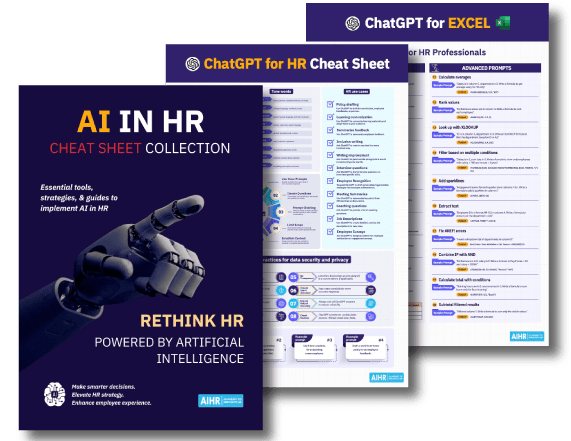
11 practical applications of AI in performance management
Below are 11 practical applications of AI in performance management, complete with actionable steps you can take to incorporate them at your organization:
1. AI in overall performance management
AI can streamline performance management and lighten HR’s administrative burden by automating tasks, analyzing data, and generating feedback and reports. This allows for better-informed decision-making and more time to focus on strategic projects.
Actionable HR steps
- Find the right system: Consider AI capabilities such as data analytics, real-time feedback, user experience (UX), and report generation. Other important factors include integration and scalability, customization, and security and compliance.
- Choose the best review cycle: AI systems can offer flexibility in scheduling performance reviews. Pick one that accommodates multiple options to better meet employee, team, and manager needs in terms of review cycles and schedules.
2. AI in performance review automation
AI can reduce the time managers would otherwise spend preparing for performance appraisals. It monitors employee performance, merges input from multiple sources, and drafts initial appraisals.
Actionable HR steps
- Help managers make full use of AI features: Train them on the AI system’s ability to track individual performance metrics and send alerts when employees fall behind. This lets managers take immediate action to mitigate issues.
- Prioritize customized setups: Find a platform that allows for tailored performance reviews, so each employee can receive appraisals specific to their performance, goals, and overall professional needs.
3. AI in goal-setting
AI algorithms can review past performance and industry benchmarks, and use company goals to propose KPIs and employee targets, while generative AI can draft initial goal statements and measure progress.
Actionable HR steps
- Implement an AI-powered goal-setting tool: Seek out platforms that employ the SMART (Specific, Measurable, Achievable, Relevant, and Time-bound) goal-setting method.
- Feed the system with relevant data: Ensure the tool can access job descriptions, past performance reviews, and strategic priorities.
- Offer training and guidance: Guide employees on how to use GenAI suggestions to help get themselves started on goal-setting.
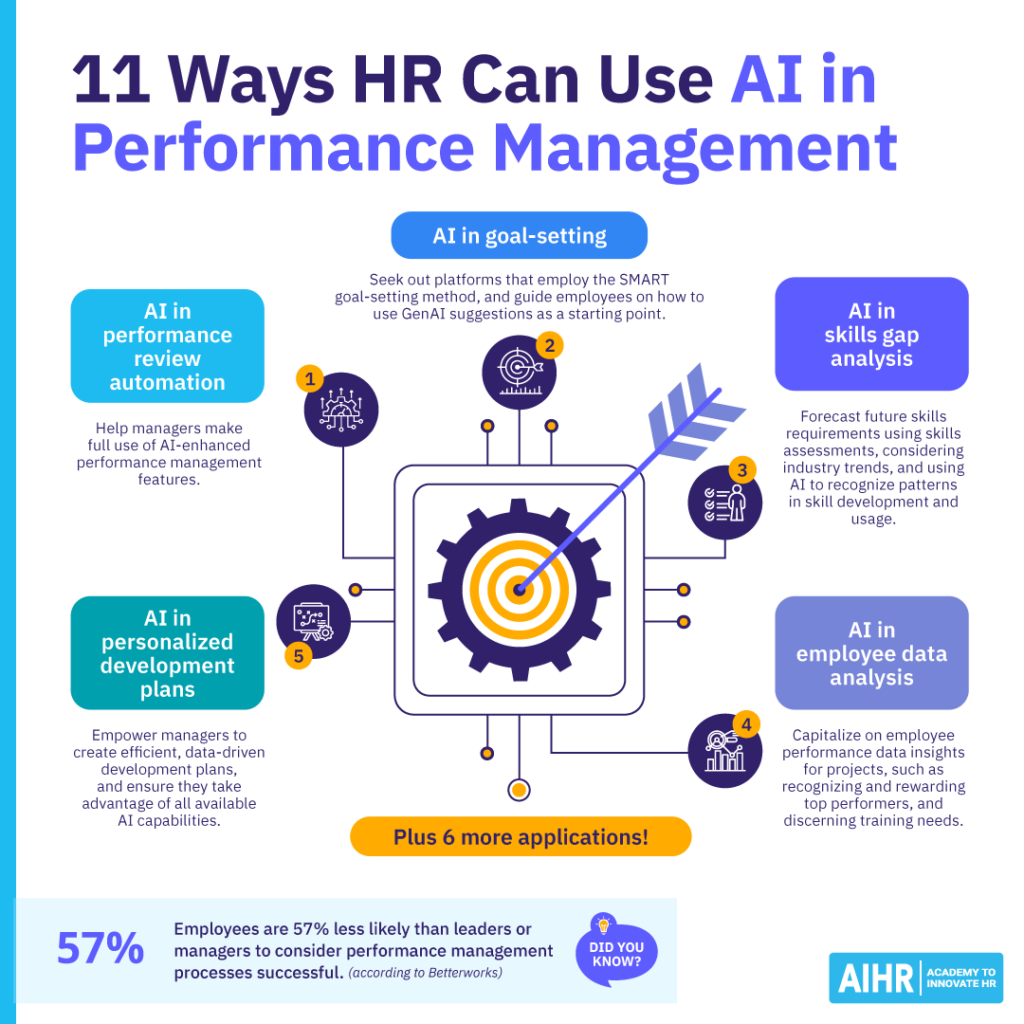
4. AI in skills gap analysis
A skills gap analysis pinpoints which skills employees must have to improve their performance. AI also quickly analyzes vast datasets to detect skill deficiencies in particular departments throughout the organization.
Actionable HR steps
- Identify emerging skills needs: Forecast future skills requirements using employee skills assessments, considering industry trends, and using AI to recognize patterns in skill development and usage.
- Update performance competencies: Incorporate the anticipated critical skills in your organization’s performance criteria and communicate these to all employees and managers.
5. AI in employee data analysis
AI’s advanced algorithms can rapidly process large amounts of employee data, including employee performance metrics and previous performance reviews. AI also uses predictive analytics to identify high and low performers.
Actionable HR steps
- Make good use of AI data insights: Capitalize on employee performance data insights for projects, such as recognizing and rewarding top performers, discerning training needs, and strategic succession planning.
- Optimize talent development: Use AI’s insights to tailor personalized development plans, ensuring employees receive relevant training and support to reach their potential.
Master the application of AI in performance management
To improve business outcomes, workforce performance, and employee retention, you must be able to expertly apply Artificial Intelligence to performance management.
✅ Learn to use AI effectively and ethically to ensure success and compliance
✅ Use AI to extract and summarize data, enhance productivity, and boost L&D
✅ Explore how AI can enhance HR productivity and decision-making
✅ Learn to apply innovation in AI for continuous improvement
Learn at your own pace with the online Artificial Intelligence for HR Certificate Program and progress on your own terms.
6. AI in personalized development plans
AI can make it easier for managers to design specialized development plans for each employee by analyzing individual performance data, identifying skills gaps, and recommending suitable interventions.
Actionable HR steps
- Empower managers: Provide them with AI-powered tools that deliver actionable insights from performance data, helping them design targeted, data-driven development plans.
- Help them take advantage of AI capabilities: These include plotting current skills against job requirements, analyzing performance data to recommend upskilling methods, and aligning development plans with business needs.
7. AI in performance feedback
AI generates more comprehensive feedback. Managers can enter notes into an AI program that can pull data from other sources and summarize it into feedback depicting a holistic assessment of employee performance.
Actionable HR steps
- Present multiple feedback options: Find an AI system that assimilates various types of feedback, such as manager-to-employee, peer, skip-level, customer, and self-assessments.
- Encourage managers to turn feedback into actionable goals: The precision of AI-generated feedback allows managers to communicate clearly with employees on expectations, performance, and improvement strategies.
HR tip
Using natural language processing (NLP) and machine learning algorithms, AI can even analyze intangible aspects of employee performance, such as innovation, collaboration, and contribution in team settings.
8. AI in employee self-evaluation
Employees are often required to do some form of self-evaluation before performance appraisals. AI can compile data from work and communication platforms to capture and structure information from these evaluations.
Actionable HR steps
- Encourage employees to tap into AI: Inform employees of how AI can help them prepare for performance evaluations by offering real-time feedback and tracking progress toward their goals.
- Raise awareness: Explain that AI can summarize their achievements, suggest talking points and questions for discussions during evaluations, and recommend personalized performance goals.
9. AI in performance coaching
AI tools can contribute to a culture of continuous improvement at work in two key ways: by prompting managers to give their team members regular feedback and acting as virtual coaches.
Actionable HR steps
- Choose and implement suitable AI performance coaching: Options include AI coaches that guide employees through self-assessments, monitor performance, provide real-time feedback, and offer support.
- Encourage a feedback loop: Use AI to create a continuous feedback cycle, enabling employees to receive ongoing input on their performance and adjust their strategies in real-time.
10. AI in career pathing
AI enables staff to plan and manage their career growth by letting them input their performance data and professional aspirations. GenAI can then suggest suitable career development options and outline the steps to achieve them.
Actionable HR steps
- Create career planning guides: Use GenAI to create sample career paths demonstrating what employees can do to grow in their current roles, make strategic lateral moves, or handle future opportunities.
- Start (or update) a mentorship program: AI can help design mentorship plans aligned with employees’ career trajectories, pair them with mentors, and even propose discussion topics to foster meaningful conversations.
11. AI in learning and development
Performance management systems generate large amounts of data that AI can quickly synthesize to assess training needs. It can also assist you in developing and implementing individualized learning programs.
Actionable HR steps
- Use AI’s predictive analytics: Assess the performance trends AI reveals to understand where skills growth is needed, spot employee development opportunities, and allocate resources efficiently.
- Accommodate employees’ unique learning styles: Take advantage of AI’s training assistance capabilities, such as analyzing skills and learning styles, providing real-time feedback, and identifying knowledge gaps.
HR roadmap for implementing AI in performance management
While AI has great potential in performance management, you must implement it properly to maximize its capabilities and ensure it benefits your organization and workforce.
The HR roadmap below will guide you through the process of enabling AI-powered performance management across the organization:
Identify needs
Consider the most challenging or cumbersome aspects of your current performance management process, and identify the specific areas AI can simplify or enhance. This can include gathering data, summarizing feedback, process automation, or aligning individual employee goals with strategic organizational objectives.
Select the right research tools
It’s important to choose AI tools that fit your organization’s needs. When doing your research, keep in mind these essential issues:
- Features offered (i.e., data analytics capabilities, real-time feedback, goal setting and tracking, etc.)
- Price
- User experience (UX)
- Integration capabilities
- Data security
- Vendor reputation.
Conduct pilot testing
Test AI tools on a small scale with a team experienced in AI. This allows you to assess their impact on performance evaluations, feedback accuracy, and goal alignment. It also helps identify potential challenges, and gather insights into UX, and gives you the opportunity to refine the system based on feedback before rolling it out company-wide.
AI can be used to enable managers to have more meaningful and fact-based performance conversations, identify and spot trends, and eliminate bias — but only if it is used to augment and complement the human experience of performance. AI should never replace the manager-employee interaction in the process.

Ensure data privacy
Performance management data contains sensitive information, and entering it into an AI system makes it vulnerable to hacking. Create guidelines for what personal or company information can and can’t be shared with AI programs. Additionally, use encryption to convert this data into a secure format that only authorized parties can access or decrypt.
Provide training
Equip managers and employees to use AI in performance reviews effectively and ethically. This type of training can include:
- Explaining key AI concepts
- Hands-on practice with AI tools
- Case studies that illustrate how effective the new system will be
- Data privacy compliance and ethical use procedures
- Role-specific training for employees, managers, and HR teams.
Monitor impact
Regularly assess AI’s impact by gathering feedback and comparing pre- and post-implementation metrics (e.g., productivity, satisfaction, or retention). Methods you can use to monitor impact include:
- User feedback mechanisms
- Employee and manager focus groups
- Comparing pre- and post-AI deployment metrics (e.g., employee productivity, retention, satisfaction, and engagement rates).
Maintain the human touch
Remember — AI tools can’t replace human logic, nuance, or judgment. You must set up your AI-enhanced performance management system to produce appropriate, ethical findings. Additionally, managers must review AI-generated feedback for accuracy and communicate it to employees with empathy and compassion.
To sum up
AI improves performance management by increasing objectivity, providing real-time feedback, and streamlining administrative tasks. It allows HR to focus on strategic decisions while enhancing employee development, but successful implementation requires careful planning, pilot testing, and data privacy safeguards.
Despite AI’s advantages, human judgment remains crucial. HR must review AI-generated insights with empathy and ensure the system complements, rather than replaces, personal interaction to maintain fairness and effectiveness.


